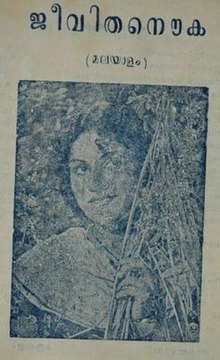Jeevitha Nouka: Difference between revisions
NatyamZ27854 (talk | contribs) |
NatyamZ27854 (talk | contribs) |
||
| Line 34: | Line 34: | ||
* Nanukuttan as [[Zamindar]] |
* Nanukuttan as [[Zamindar]] |
||
* [[Sebastian Kunjukunju Bhagavathar]] as Soman's brother |
* [[Sebastian Kunjukunju Bhagavathar]] as Soman's brother |
||
;Support cast |
|||
*[[Muthukulam Raghavan Pillai]] |
|||
* [[Muthukulam Raghavan Pillai]], Ambalappuzha Ravunni, [[Girija (actress)|Baby Girija]], Jagadamma, Janamma, Mathappan, Mulavana, Soman Pillai. |
|||
*Ambalappuzha Ravunni |
|||
*Baby Girija |
|||
*Jagadamma |
|||
*Janamma |
|||
*Mathappan |
|||
*Mulavana |
|||
*Soman Pillai |
|||
==Tamil Cast== |
==Tamil Cast== |
||
Revision as of 03:03, 30 December 2019
| Jeevitha Nouka | |
|---|---|
 The advertisement of the Malayalam version of the film | |
| Directed by | K. Vembu |
| Written by | Muthukulam Raghavan Pillai |
| Produced by | K. V. Koshi Kunchako |
| Starring | Thikkurissi Sukumaran Nair B. S. Saroja Adhimoolam Pankajavalli S.P.Pillai Nanukuttan |
| Cinematography | P. B. Mani |
| Edited by | S. Williams |
| Music by | V. Dakshinamoorthy |
Production companies | K&K Combines (Udaya Studios) |
Release date |
|
Running time | 170 minutes |
| Country | India |
| Language | Malayalam |
| Budget | ₹ 5 lakhs[1] |
| Box office | 30 lakhs |
Jeevitha Nouka (Template:Lang-en) is a 1951 Malayalam film directed by K. Vembu and jointly produced by K. V. Koshi and Kunchako. It was the first "super hit film" in Malayalam cinema, with a theatrical run of 284 days.[2][3] Made at a budget of ₹ 5 lakhs, the film did extremely well at the box office, such that very few films could surpass it later.[1] It was simultaneously shot in Tamil and Telugu, and was dubbed and released in Hindi.[4] The film portrayed the life of simple folk in a small village in Kerala. It stars Thikkurissi Sukumaran Nair and B. S. Saroja in the lead roles, with the latter making her debut and the former in his first major role.[5] Its music is composed by V. Dakshinamoorthy and popular playback singer Mehboob debuted through this film.[4] It is a remake of the Hindi film Jeevan Nayya with revised screenplay.
The Tamil version was titled Pichaikkaari (Template:Lang-en) and released on 18 May 1951. Vidwan P. Adhimoolan wrote the dialogues and lyrics.[6] The song Vanaraniye enthan manaraniye sung by Thiruchi Loganathan and P. Leela was a popular number.
Malayalam Cast
- Thikkurissi Sukumaran Nair as Soman
- B. S. Saroja as Lakshmi
- Adhimoolam as Kaniyan
- Pankajavalli as Janu
- S. P. Pillai as Shanku
- Nanukuttan as Zamindar
- Sebastian Kunjukunju Bhagavathar as Soman's brother
- Support cast
- Muthukulam Raghavan Pillai, Ambalappuzha Ravunni, Baby Girija, Jagadamma, Janamma, Mathappan, Mulavana, Soman Pillai.
Tamil Cast
Box office
The film was considered as the first "Super Hit" status Malayalam film. The film was both critical and commercial success and ran over 284 days in theatres.[7]
References
- ^ a b M. A. Oommen, Kumbattu Varkey Joseph (1991). Economics of Indian cinema. India: Oxford & IBH Publications. p. 50. ISBN 81-204-0575-7.
- ^ Thoraval, Yves (1998). The cinemas of India (Les Cinemas de L lnde) (in French). France: Macmillan India. ISBN 0-333-93410-5.
- ^ Kerala Sahitya Academy (1998). Malayalam literary survey Volume 20, Issue 1. Malayalam literary survey. India: Macmillan India. p. 23.
- ^ a b B. Vijayakumar (16 August 2008). "Jeevitha Nouka 1951". The Hindu. Archived from the original on 16 October 2016.
- ^ National Film Development Corporation of India (1991). Cinema in India: Volume 2. Cinema in India. India. ISBN 0-333-93410-5.
{{cite book}}: CS1 maint: location missing publisher (link) - ^ Film News Anandan (23 October 2004). Sadhanaigal Padaitha Thamizh Thiraipada Varalaru [History of Landmark Tamil Films] (in Tamil). Chennai: Sivakami Publishers. Archived from the original on 21 September 2017.
- ^ "J for Jeevitha Nauka (1951)". Rediff.com. 20 April 2012.
External links
- Jeevitha Nouka at IMDb
- Jeevitha Nouka at the Malayalam Movie Database
